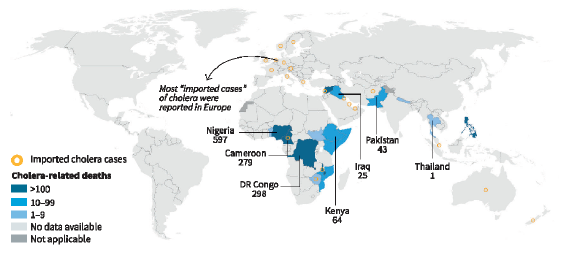Social Justice
Cholera
- 06 Oct 2023
- 5 min read
For Prelims: Cholera, World Health Organization (WHO), Vibrio cholerae, Oral Cholera Vaccines (OCV), Acute Diarrheal Illness.
For Mains: Cholera, its causes and related Initiatives, Issues Relating to Development and Management of Social Sector/Services relating to Health.
Why in News?
According to the World Health Organization (WHO)’s weekly Epidemiological Record, the World reported more than twice as many cholera cases in 2022 as it did in 2021.
- This escalation presents a substantial challenge to the WHO ambitious goal set in 2017 to reduce global cholera deaths by 90% by 2030.
What is Cholera?
- About:
- Cholera, a water-borne disease primarily caused by the bacteria Vibrio cholerae strains O1 and O139, poses a significant public health challenge worldwide.
- Strain O1 is the predominant cause of outbreaks, with O139 occurrences being rare and mostly confined to Asia.
- It is an acute diarrheal illness caused by infection of the intestine.
- The infection is often mild or without symptoms, but sometimes can be severe.
- Cholera, a water-borne disease primarily caused by the bacteria Vibrio cholerae strains O1 and O139, poses a significant public health challenge worldwide.
- Symptoms:
- Profuse watery diarrhoea, Vomiting, Leg cramps
- Transmission:
- A person may get cholera by drinking water or eating food contaminated with the cholera bacterium.
- The disease can spread rapidly in areas with inadequate treatment of sewage and drinking water.
- Vaccine:
- Currently there are three WHO pre-qualified Oral Cholera Vaccines (OCV), Dukoral, Shanchol, and Euvichol-Plus. All three vaccines require two doses for full protection.
What are Factors Driving the Escalation of Cholera Cases?
- Decline in Covid Pandemic Restrictions:
- The decline in Covid-19 pandemic restrictions played a crucial role in allowing the spread of cholera. Limited investments in providing adequate care to vulnerable populations, effects of climate change, and escalating conflicts further exacerbated the situation.
- Insufficient Access to Sanitation:
- The symbiotic relationship between cholera transmission and insufficient access to clean water and sanitation facilities is a critical factor.
- Notably, Vibrio cholerae bacteria tend to thrive in warmer waters with lower salinity, conditions intensified by climate change-induced floods, heatwaves, intense monsoonal rains, storms, and prolonged warm periods.
- Vibrio Pathogens and Microplastics:
- According to research from the University of Florida in June 2023, Vibrio pathogens possess a unique capability to adhere to microplastics, potentially adapting to this environment, even in the open ocean.
- This interaction between Vibrio bacteria and microplastics signifies an additional dimension to cholera transmission dynamics, necessitating further investigation and policy considerations.
- Climate Change and Cholera Transmission:
- A study published in 2021 in The Lancet Planetary Health emphasizes how climate change intensifies cholera concerns.
- It predicted a potential increase of 38,000 km in coastline conducive to Vibrio bacteria development by 2100, compared to the 1850-2014 average.
What are the Geographical Distribution and Cholera Trends?
- The majority of cholera cases persistently emanate from Africa and Asia, with Europe sporadically reporting "imported cases."
- In Africa, the 2022 cholera cases were more dispersed compared to 2021, with no single country reporting more than 25% of all cases and 30% of all deaths.
- However, this apparent improvement is overshadowed by the doubling of case and death numbers in countries apart from Nigeria, which experienced a massive cholera outbreak in 2021.
- A similar pattern of increased cases was observed in Asia, notably in countries like Lebanon, Syria, and Afghanistan.
What are the Initiatives to Curb Cholera?
- A global strategy on cholera control, Ending Cholera: A global roadmap to 2030, with a target to reduce cholera deaths by 90% was launched in 2017.
- Global Task Force for Cholera Control (GTFCC): WHO revitalized the Global Task Force for Cholera Control (GTFCC) to strengthen WHO’s work in eradicating cholera.
- The purpose of the GTFCC is to support increased implementation of evidence-based strategies to control cholera.
What can be the Response Measures to Tackle Cholera?
- To address the growing cholera burden globally, adaptations in the recommended oral cholera vaccine regimen have been made.
- While awaiting the fruition of larger-scale manufacturing investments, the management of the emergency stockpile for the oral cholera vaccine has modified the vaccination regime, reducing it from two doses to a single dose.
- This strategic adjustment aims to enhance the efficiency and reach of cholera vaccinations.





